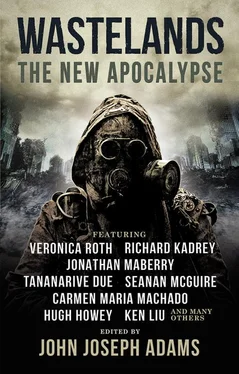“I can only give you an hour,” he said. “More tension than usual, with the Minos Trials approaching.”
“That’s fine, I won’t be long,” Kata said.
The trials were Kata’s reason for coming in the first place. She wanted to know what evidence the sylphs were presenting on their own behalf. It was solid; she didn’t need to decide what to do with Erszi’s Echo—it wouldn’t matter either way.
And Maria would have the information she needed. Maria knew everything.
She hadn’t realized how tense she was until she stepped into the grid of the sylph quarter and was finally able to relax. She didn’t have to do as much pretending here. She tied her heavy hair back, wicking sweat from her neck with her hand as she did, and shed the heavy jacket she wore to conceal her prosthetic arm. She also made less of an effort to move with the light spring in her step that scanned to observers as “human”. She was as out of place here as she was in the human quarter, of course—more, perhaps, because it was impossible to pass as a sylph with a flushed face and a rumbling stomach—but the sylphs kept their reactions to themselves, or expressed themselves in ways she couldn’t yet decipher, so walking among them was simpler.
The quarter had no signs—not all sylphs could “see” in the way that a human saw—but Kata had memorized the way to Maria’s place, so it didn’t matter. The air here smelled different—like grease and burnt plastic instead of fryer oil—and the refuse that piled in the streets was different, too: old wires and broken tools and busted screens instead of food wrappers, bottles, and condom wrappers. As she approached Maria’s shop, Kata kicked a cracked metal plate out of the doorway and then slipped inside.
Maria had modeled herself after her namesake in the movie Metropolis : she was humanoid, womanly, sleek. Kata had often wondered why she would mimic a human body so closely before understanding that it was intended as irony: Maria repaired busted sylphs for a lower price than the established vendors, and she did it wearing a human body as a costume—one she had chosen herself, not a human master, which made all the difference, Kata had learned.
The sylph was sorting through a pile of nuts and bolts when Kata approached, and without looking up, her free hand reached out to turn on a lamp.
“Thanks,” Kata said, pulling out a stool from under the counter and perching on top of it. “How’s business?”
“You shouldn’t be here,” Maria said. Her voice was a feminine chirp, modulated like a human voice, but with a distinct robotic character to it all the same. “And you should not return until after the trials, whatever their outcome.”
“They know me here,” Kata said.
“I didn’t mean just here , in the sylph quarter,” Maria said, still sorting. Her fingertips were a marvel of engineering, capable of quick, delicate movements that Kata still found mesmerizing. “I mean the entire outpost. I’ve heard there is violence brewing among your kind as well as ours, toward… people like you.”
“Did you hear this from your sylph government friend?” Kata smiled.
“Perhaps.”
“If that’s the case, there’s not many places I can go where humans won’t feel that way. Can’t yank out my skeleton, Maria.”
She couldn’t remove the parts of her that humans hated when they were the same parts keeping her alive. And moreover, she didn’t want to.
“I suppose that’s true,” Maria said. “But perhaps now is the time for an extended scavenging mission.”
“You’re worried about me,” Kata said. She looked down at her prosthetic hand, glinting in the light. “I wonder if your worry feels the same as mine.”
“What do you mean?”
“Fear is… mammalian. Essential to survival for any organism that has natural predators,” Kata said. “You don’t have predators, not really—so why did you program it? Why not write it out of your programming entirely?”
Maria’s voice was flatter than usual when she replied. “If I was never afraid, how would I know to protect myself? If I was never angry, how would I know to fight for what I want?”
“Yeah, I just… wonder if we’re using one word for two different feelings. If the way fear feels, to me, is the same as the way it feels to you.”
“You are wondering if I am as real as you are,” Maria said.
“No, that’s not—” Kata shook her head. “That’s not what I meant.”
“Yes it is. You are wondering if my feelings ‘count’. If I am as worthy as you are of existence.” Maria pressed too hard on one of the bolts, and it shot away from the countertop, hitting the opposite wall with a ding! “Let me make this clear, then: I am not human, and I have no desire to be. Your kind is not an ideal to which I aspire.”
“I—”
“Please leave,” Maria said.
Kata didn’t argue. But, before leaving, she paused in the dark doorway to say, “I’m sorry.”
* * *
Back on the ship, Kata sat at the table in the galley. She had lined up all the Echoes she had retrieved from all their hiding places, on Earth as well as its moon. The first one, she had found while unpacking her parents’ things on the moon colony. When she had asked her father about it, he had said something about Erszi’s friend leaving it behind after one visit. That one had led her to the next, which she bought on the gray market at the outpost on the way to Mars. The third, she had gone to Berlin to scavenge. Then Budapest for the fourth.
She rested her chin on her hands and stared down at the Echoes. Together, they made an airtight case for the Minos Trials—just not for the right side, the human side.
One of them hinted at the idea for the weapon Ütközet had developed, and another at the hours spent engineering it. The third detailed how they had disguised their activity from anyone who might be watching. But no Echo established the intent to use the weapon as clearly as Erszi’s did.
“What will you do with them now?” Drobo asked her.
Kata rolled Erszi’s Echo toward herself and back, a few centimeters at a time.
“I don’t know,” she said.
“ If you send them to the Earth Justice Commission, what will they do?” Drobo said. “ Drop their case?”
“I don’t think so. I think if I send them there, they will be destroyed,” Kata said. “Without them, the sylphs have no proof that their initial attack on Earth wasn’t a war crime. All it takes is one corrupt person and the whole thing falls apart.”
“Because it is a war crime ,” Drobo said, “ to attack without cause .”
“To attack only to kill, and not to defend yourself,” Kata said, nodding. “Which is what they were doing—defending themselves against Ütközet. Against Erszi.”
“Ütközet—”
Kata laughed. “Your Hungarian pronunciation is horrible.”
“ I don’t have lips, so it is difficult for me to articulate those particular vowels .” Drobo sounded irritable. “Ü tközet’s virus—you believe it actually could have killed the sylphs, if your sister had been able to hack through their defenses?”
“Say what you like about the sylphs, but they’re careful,” she said. “They wouldn’t have attacked Earth if they didn’t think it was their best chance of survival.”
“Indeed ,” Drobo said. “ So, if you don’t want this evidence destroyed… what do you want instead?”
“I want…” She laughed a little. “I want to remember my sister as the one stashing cigarettes in a teddy bear, not the one plotting to commit genocide. I want my family’s name to be unsullied by what she’s done. I want to run up the hill to the Hotel Belvedere without a helmet on and scold the teenagers for making out on all the benches. I want to go home .”
Читать дальше


![Nick Cracknell - The Quiet Apocalypse [= Island Zero]](/books/28041/nick-cracknell-the-quiet-apocalypse-island-zero-thumb.webp)









